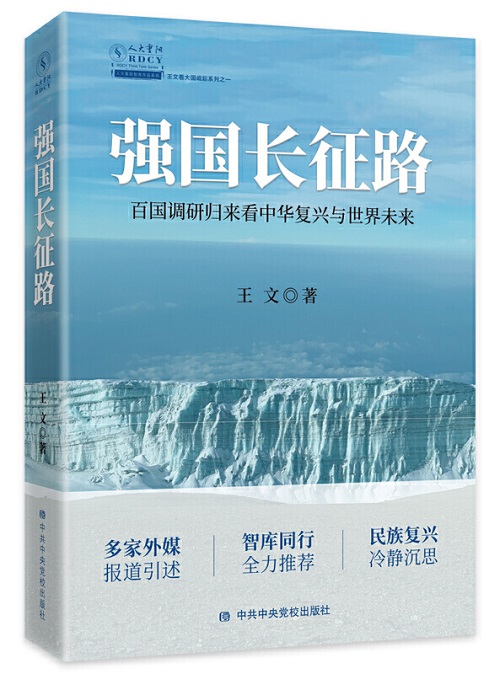Major Power Relations
Your Present Location: PROGRAMS> Major Power RelationsWang Wen: How can the US sell more goods to China?
By: Wang Wen Source: Global Times Published: 2020-01-21

After China and the US signed the phase one trade agreement, many friends from Europe, Southeast Asia and Japan asked me for my views. Different from the Chinese public which pays more attention to Chapter 4 "Financial Services" of the agreement, foreign elites are more concerned about Chapter 6 - "Expanding Trade."
China promises in Chapter 6 that during the two-year period from January 1, 2020 through December 31, 2021, it would ensure purchases and imports into China from the US of manufactured goods, agricultural goods, energy products, and services exceeding the corresponding 2017 baseline amount by no less than $200 billion.
Specifically, no less than $77.7 billion of manufactured goods, $52.4 billion of energy products and $37.9 billion of services would be purchased and imported into China from the US. Such huge increases are astounding.
According to Chinese media reports, the outcome of the China-US trade talks is in line with the direction of Beijing to comprehensively deepen reform and also conforms to China's goal to boost consumption demand. At present, more than 65 percent of China's petroleum depends on imports, and the country is also the world's largest importer of silicon chips, integrated circuits and semiconductors. From this perspective, there is nothing wrong with buying more US goods.
However, looking further into various voices both at home and abroad, one will find that the China-US trade deal is not only a result of tough negotiations, but will also lead to new cruel competition in the market.
According to my colleague, professor He Weiwen who worked for the Ministry of Commerce for over 30 years, goods worth $153.9 billion were imported from the US into China in 2017 and the figure declined to $122.7 billion in 2019. Based on the trade agreement, China will have to increase its imports from the US to at least $232.2 billion in the next two years, an average annual growth of about 70 percent. It's a rather difficult target. China's imports from countries other than the US have increased only by $152.9 billion over the past five years.

China's major trading partners such as the European Union, Southeast Asian countries and Japan are worried about whether the country will reduce imports from them. Some even doubt if the China-US trade deal is in compliance with WTO rules. There are chambers of commerce in Europe suggesting that the continent should pressure China into a trade negotiation so that it will import more European products.
Chinese patriots who support domestic products worry that too many imports of American goods would hit the Chinese domestic players. Some Chinese are also concerned about the entry of US financial institutions such as securities and insurance companies as well as banks, even though they know that China came up with the goal of fully opening up the financial sector and balancing trade structure as early as in 2013.
Can China digest such a huge increase in imports from the US? I think the country has the potential, but it might be stuffed in the short term. It's like people who have a good appetite, but one might choke up if eating too fast.
In 2019, China's population exceeded 1.4 billion for the first time. According to the National Bureau of Statistics of China, the total retail sales of consumer goods in China reached 41,164.9 billion yuan ($5.9 trillion) in 2019, went up by 8 percent year-on-year. Barring unforeseen circumstances, China will overtake the US to become the world's largest consumer of goods in the coming two years. In that case, it will be fully capable of digesting the increased imports.
The key issue is, when such a situation occurs, it might impact the original process of structural adjustment in China's growth in social consumption. There will be fierce competition in Chinese markets among US products, other foreign merchandise and Chinese goods.
The rational choice of the Chinese market will be the key to determining the results of the competition. According to the phase one deal, "The United States shall ensure to take appropriate steps to facilitate the availability of US goods and services to be purchased and imported into China… purchases will be made at market prices based on commercial considerations and that market conditions." If the US goods are too expensive or if their quality is too poor, China has the right not to increase the amount of purchase from the US. By then, the agreement will not be fulfilled and both parties will be responsible.
Therefore, I would like to suggest that the US lift restrictions on the exports of high-tech products to China as soon as possible, loosen the policies which limit Chinese companies' investment in the US and welcome Chinese enterprises to be listed in the US. Only in that way can China reach the goal of increasing imports from the US to $232.2 billion.
I would also like to urge other countries to explore the market in China. China's GDP per capita passed $10,000 in 2019, which is far below the level in developed countries. In the next 15 years, China's GDP per capita is expected to reach $20,000, with the country's urban population increasing by 300 to 500 million, which signals a broad market. Developing the Chinese market will bring more dividends for the world.
I want to tell Chinese people to have confidence in the country's opening-up. The more open our market, the more China will develop and the stronger Chinese companies will become. When China embraces opening-up in an all-round way, both the country and the world will prosper.
The author is professor and executive dean of Chongyang Institute for Financial Studies, at Renmin University of China and executive director of China-US People-to-People Exchange Research Center. His new book Great Power's Long March Road was launched recently.
























































































 京公网安备 11010802037854号
京公网安备 11010802037854号





